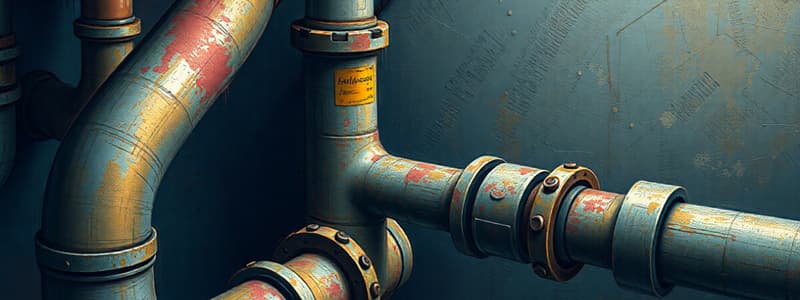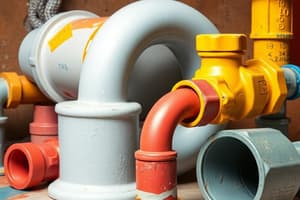Podcast
Questions and Answers
What characterizes ferrous metals?
What characterizes ferrous metals?
- They are composites made from multiple elements
- They contain iron and are magnetic (correct)
- They are exclusively used for plumbing fixtures
- They are non-magnetic and resistant to corrosion
Which of the following is an example of a non-ferrous metal used in plumbing?
Which of the following is an example of a non-ferrous metal used in plumbing?
- Copper (correct)
- Bronze
- Iron
- Steel
What is a key property of thermoplastics used in plumbing?
What is a key property of thermoplastics used in plumbing?
- They are resistant to temperature changes
- They cannot be molded once set
- They are exclusively used for hot water applications
- They can be recycled and reshaped when heated (correct)
Which alloy is a mixture of copper and tin?
Which alloy is a mixture of copper and tin?
What effect does corrosion have on ferrous metals?
What effect does corrosion have on ferrous metals?
Which of the following thermoplastics is suitable for hot water applications?
Which of the following thermoplastics is suitable for hot water applications?
What is the formula used to calculate weight?
What is the formula used to calculate weight?
Which of the following statements about thermosetting plastics is true?
Which of the following statements about thermosetting plastics is true?
What is the density calculated based on?
What is the density calculated based on?
In what condition does High Density Polyethylene (HDPE) degrade?
In what condition does High Density Polyethylene (HDPE) degrade?
Which of the following materials is considered a good conductor of heat?
Which of the following materials is considered a good conductor of heat?
What is the equivalent of 1 kg in terms of weight on Earth?
What is the equivalent of 1 kg in terms of weight on Earth?
Which property of mass influences the force of gravity between objects?
Which property of mass influences the force of gravity between objects?
What primarily causes dezincification in brass components?
What primarily causes dezincification in brass components?
What is the primary role of a sacrificial anode in a hot water cylinder?
What is the primary role of a sacrificial anode in a hot water cylinder?
What type of corrosion occurs if flux is not cleaned after a solder joint is made?
What type of corrosion occurs if flux is not cleaned after a solder joint is made?
How does electrolytic corrosion occur in a plumbing system?
How does electrolytic corrosion occur in a plumbing system?
What effect does turbulence in water flow have on erosion?
What effect does turbulence in water flow have on erosion?
What is one way plastics can degrade?
What is one way plastics can degrade?
What substances can lead to blue water corrosion in a plumbing system?
What substances can lead to blue water corrosion in a plumbing system?
What happens to the weakest metal in a plumbing system due to electrolytic corrosion?
What happens to the weakest metal in a plumbing system due to electrolytic corrosion?
What is the specific heat capacity of water?
What is the specific heat capacity of water?
How much energy is required to raise 150 liters of water from 10°C to 50°C?
How much energy is required to raise 150 liters of water from 10°C to 50°C?
Which material has the highest coefficient of linear expansion?
Which material has the highest coefficient of linear expansion?
What is the most common form of corrosion?
What is the most common form of corrosion?
Which factor does NOT significantly influence the rate of corrosion?
Which factor does NOT significantly influence the rate of corrosion?
How much will a 6 meter length of plastic guttering expand with a temperature rise of 100°C?
How much will a 6 meter length of plastic guttering expand with a temperature rise of 100°C?
Which method is NOT used to prevent corrosion in iron?
Which method is NOT used to prevent corrosion in iron?
What is the characteristic of cast iron when used in central heating systems?
What is the characteristic of cast iron when used in central heating systems?
What happens to a solid material with a density of 0.85 in water?
What happens to a solid material with a density of 0.85 in water?
Which of the following materials has the highest density?
Which of the following materials has the highest density?
What does malleability refer to in materials?
What does malleability refer to in materials?
Which property measures how strong a material is when it is pulled?
Which property measures how strong a material is when it is pulled?
If a gas has a density of 1.2, what will it do in the presence of air?
If a gas has a density of 1.2, what will it do in the presence of air?
What does specific heat capacity measure?
What does specific heat capacity measure?
What is the term for the resistance of a material to scratching or abrasion?
What is the term for the resistance of a material to scratching or abrasion?
In terms of buoyancy, which statement is true for substances with a density of less than 1?
In terms of buoyancy, which statement is true for substances with a density of less than 1?
Flashcards
Ferrous Metals
Ferrous Metals
Metals containing iron, such as steel or cast iron. They are magnetic and susceptible to corrosion.
Non-Ferrous Metals
Non-Ferrous Metals
Metals that do not contain iron, such as copper, lead, zinc, and aluminum. These metals are generally more resistant to corrosion.
Alloys
Alloys
A combination of two or more metals. Brass, bronze, and gunmetal are examples used in plumbing.
Thermoplastic
Thermoplastic
Signup and view all the flashcards
Corrosion
Corrosion
Signup and view all the flashcards
Tensile Strength
Tensile Strength
Signup and view all the flashcards
Compressive Strength
Compressive Strength
Signup and view all the flashcards
Shear Strength
Shear Strength
Signup and view all the flashcards
Ductility
Ductility
Signup and view all the flashcards
Malleability
Malleability
Signup and view all the flashcards
Hardness
Hardness
Signup and view all the flashcards
Specific Heat Capacity
Specific Heat Capacity
Signup and view all the flashcards
Thermal Conductivity
Thermal Conductivity
Signup and view all the flashcards
Thermosetting Plastic
Thermosetting Plastic
Signup and view all the flashcards
Mass
Mass
Signup and view all the flashcards
Weight
Weight
Signup and view all the flashcards
Density
Density
Signup and view all the flashcards
Heat Transfer
Heat Transfer
Signup and view all the flashcards
Good Heat Conductor
Good Heat Conductor
Signup and view all the flashcards
Poor Heat Conductor
Poor Heat Conductor
Signup and view all the flashcards
Heat Energy Calculation for Water
Heat Energy Calculation for Water
Signup and view all the flashcards
Coefficient of Linear Expansion
Coefficient of Linear Expansion
Signup and view all the flashcards
Guttering Expansion Calculation
Guttering Expansion Calculation
Signup and view all the flashcards
Inhibitor
Inhibitor
Signup and view all the flashcards
Galvanised Coating
Galvanised Coating
Signup and view all the flashcards
Electrolytic Corrosion
Electrolytic Corrosion
Signup and view all the flashcards
Dezincification
Dezincification
Signup and view all the flashcards
Pitting Corrosion
Pitting Corrosion
Signup and view all the flashcards
Blue Water Corrosion
Blue Water Corrosion
Signup and view all the flashcards
Study Notes
Plumbing Materials
- Plumbing uses various materials, including metals, alloys, and plastics.
Lesson Intent
- Learners will understand the makeup of plumbing materials.
- Learners will identify and describe different forms of corrosion and their impact on plumbing materials.
- Learners will describe diverse properties of plumbing materials.
- Learners can determine the coefficient of linear expansion and specific heat capacity of plumbing materials.
Metal Types
- Ferrous metals contain iron and are magnetic. They corrode easily if untreated and often form ferrous oxide (rust).
- Non-ferrous metals lack iron and include copper, lead, aluminum, zinc.
- Alloys are mixtures of two or more metals. Common plumbing alloys include brass (copper and zinc), bronze (copper and tin), and gunmetal (copper, tin, and zinc). Steel is iron and carbon
Plastics
- Plumbers use various plastics daily for various plumbing purposes, like water, heating, and drainage.
- Thermoplastics are plastics made from polymer resins, shaped by heat, and can become brittle when frozen. They are often recyclable. Examples: PVCu, MDP, and HDPE.
- Thermosetting plastics are rigid plastics that can tolerate high temperatures but aren't recyclable. Examples: Formica and Bakelite.
Properties
- Mass is the amount of substance, measured in kilograms.
- Weight is the force of gravity on a mass, measured in Newtons. Weight = mass x gravity (Earth gravity ≈ 9.81N/kg)
- Density is mass per unit volume. Denser materials generally have molecules more tightly packed together.
- Relative Density is a comparison between the density of a material and the density of water (1.00). Materials with relative densities greater than 1 sink in water, and less than 1 float. Examples of densities of various materials and gases are provided in a table.
- Strength
- Tensile strength is how much a material can withstand stretching/pulling force.
- Compressive strength is how much a material can resist being crushed.
- Shear strength is a material's resistance to opposing forces.
- Ductility: A ductile material can be pulled, pushed, or stretched without breaking.
- Malleability: A malleable material can be compressed or shaped without cracking.
- Hardness: Measures a material's resistance to scratching, bending, abrasion, or cutting.
- Specific heat capacity is the amount of heat needed to raise 1kg of a substance by 1°C. Water has a high specific heat capacity (4.186 KJ/kg°C).
- Coefficient of linear expansion measures how much a material expands when heated. This is important in plumbing systems to account for changes in temperature. Plastic guttering demonstrates the largest expansion.
Corrosion
-
All materials can corrode over time, affected by environment (water, gases, dissimilar metals, acids, heat and UV).
-
Rust is a common form of corrosion in ferrous metals, occurring in the presence of water and oxygen.
-
Dezincification: a corrosion type in brass, causing zinc leaching, and degrading the material.
-
Electrolytic corrosion occurs when dissimilar metals contact in the presence of an electrolyte (water). This generates an electric current which dissolves the weakest metals.
-
Sacrificial anode (made of magnesium) can protect a central heating system from further corrosion by being preferentially corroded.
-
Pitting: a localized corrosion of copper, can occur if flux isn't cleaned away.
-
Erosion: the wearing away of pipes and fittings due to the flow of water or gas, worsened by turbulence.
-
Blue water corrosion: corrosion that can occur in stationary water systems.
Preventing Corrosion
- Inhibitors protect iron in heating systems (periodic checks).
- Galvanizing protects iron from the environment and oxygen (if coating intact).
- Painting protects iron from atmospheric corrosion. Regular maintenance is essential.
- Enamelling is used on pressed steel baths, cast iron baths, and appliance casings for protection.
Other
- Various plastic materials have different properties that affect plumbing uses, and their susceptibility to degradation, and various other factors.
Studying That Suits You
Use AI to generate personalized quizzes and flashcards to suit your learning preferences.
Related Documents
Description
Explore the various materials used in plumbing, including metals, alloys, and plastics. Identify the different forms of corrosion and understand their impact on plumbing materials. This quiz will help you grasp the properties and applications of plumbing materials essential for effective plumbing solutions.




